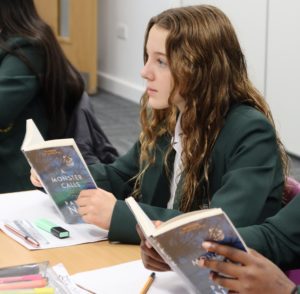Curriculum Intent

The overarching aim for English in the national curriculum is to promote high standards of language and literacy by equipping pupils with a strong command of the spoken and written word, and to develop their love of literature through widespread reading for enjoyment. With this in mind, at SHSG students of English will learn to speak and write confidently, fluently, and effectively, at length, for both pleasure and information, so that they can communicate their ideas and emotions to others and, through their reading and listening, others can communicate with them. They will consolidate and build on their knowledge of grammar and vocabulary, acquiring and developing the skills and knowledge they need to achieve outstanding grades in public examinations, including reasoning and argument, clarity of written and spoken expression, creativity, and critical reading. Through their study of English, students will encounter a wide range of increasingly challenging literary and non-literary texts that will stimulate and engage them, nurturing their curiosity and broadening their moral and cultural horizons. Our hope is that, when our students have completed their study of English, they will be confident and self-motivated readers who understand that reading literature is not just about encountering good stories; it is about understanding what it means to be human. We also hope that the study of English will encourage our students to form positive relationships by helping them to appreciate the range of human experience and emotion, as it exists now and here, as well as in the past and elsewhere. We want them to better understand the interests, needs and desires of others so that they can treat them with sympathy, tolerance and kindness, whoever they are and however differently they choose to live their lives. Ultimately, students of English at SHSG will be encouraged to think deeply about big ideas that will enrich their lives, develop their character and help them to flourish as human beings.
What does it feel like to be a student in the English Department?

As a student of English at SHSG, you will learn to use language to communicate effectively with others. Above all, this is what English is about. It is the study of language – it just happens that our language is English, so that’s what we call the subject. And language matters. There can be no doubt about that. More than anything else, it is language that makes us human.
At SHSG, you will learn to use language well. You will learn to share with others all the complex thoughts and feelings that every human-being has, swirling around in their head, tangled and muddled, longing for expression, longing for the right words. You will learn to make arguments. You will learn use evidence and reasoning to make a persuasive case for the things that matter to you. You will employ your imagination and creativity too. You will use language to transfer stories, ideas and pictures out of your head and into somebody else’s. This is the wonder of words – their unique magic. Using just twenty-six letters and a handful of punctuation marks, you will create worlds in somebody else’s mind.
You will encounter the words and worlds of others too. You will read great books by great writers, from different times, from different genres and forms, and from different parts of the world. And you will see links between these books and your own life. You will encounter complex, challenging ideas, which will help you to make sense of the world, and which you will learn to discuss and debate productively and respectfully. You will learn to understand other people too, be they the people you know and love, or people from other times and other places who you’ll never meet. You will learn to interpret the ideas and emotions of others, and to understand the motives and subtexts that lie behind their words. You will develop your powers of empathy and understanding, and you will see that stories, even fictional ones, have a great deal to say about real people’s lives and about what it means to be human.
And throughout all of this, you will be supported by teachers who are passionate about English, teachers who genuinely love books and language, deep down in their souls. You will be given clear aims and expectations about what it means to succeed, and you will have access to a lot of support, including written resources, one-to-one help from teachers, and coaching from older students who, no matter how deep the hole you find yourself in, have stood where you stand and know the way out. Your contributions in lessons will be encouraged and appreciated, and you will feel like what you have to say is important. Because it is. When you study English at SHSG, you will know that, like language, you matter.
A Level English Language
Studying A-level English Language at Southend High School for Girls will give you an opportunity to experience the multiple disciplines of the subject. The subject will immerse you in the study of writers’ use of language, as well as the study of language use in society.
You will be expected to keep well-informed about how language is evolving. You will look back at the development of the English language over time and will reflect on your own language use, which can provide an excellent insight into language use in society. You will also be invited to engage in a range of debates around the diversity of the language, using established theories of sociolinguistic topics such as gender, occupation and ethnicity.
The content of the subject is broad and there is both theory and linguistic terminology to learn. We advise students to keep detailed notes to support their learning and retention of linguistic terms. You will apply these terms to a range of texts, from an early 20th century newspaper article to a modern online blog entry.
We have prepared students for Linguistic courses in higher education at institutions such as University of Cambridge, University of Warwick, King’s College London and University of Sheffield. Many of these students have taken advantage of attending courses run by the English & Media Centre to supplement their learning and affirm their future pathway. Students also have the opportunity to enter prestigious competitions such as the NCH essay competition in year 12.
When you leave the subject at the end of year 13, you will be able to analyse language at a sophisticated level. You will have a strong appreciation of the construction of language and the choices writers make when writing. In turn, you will have the tools to produce structured and purposeful writing of your own. You will also have a broad insight into the way language is used in society. You will be able to identify patterns, usages and variables that characterise one’s use of language.
A Level English Literature
As an A-level English Literature student, you will already be an enthusiastic reader who voraciously explores different genres and styles. You will be happy to engage in critical debate and to appreciate ideas in texts which may not fit with your personal tastes in reading. You will be interested in humanity and how humans behave and will be willing to explore the consequences of human actions beyond the physical realm.
As a student, you will be willing to engage in historical and social research: you will understand that the personal, social and political context of a writer is fundamental to the text and the narrative they wish to communicate. You will also be willing to analyse a text to consider why a writer has chosen the form, style, narrative voice, word-choice and rhythm to best convey an idea, emotion or situation.
Please click on the button below to download the assessment policy for English.
